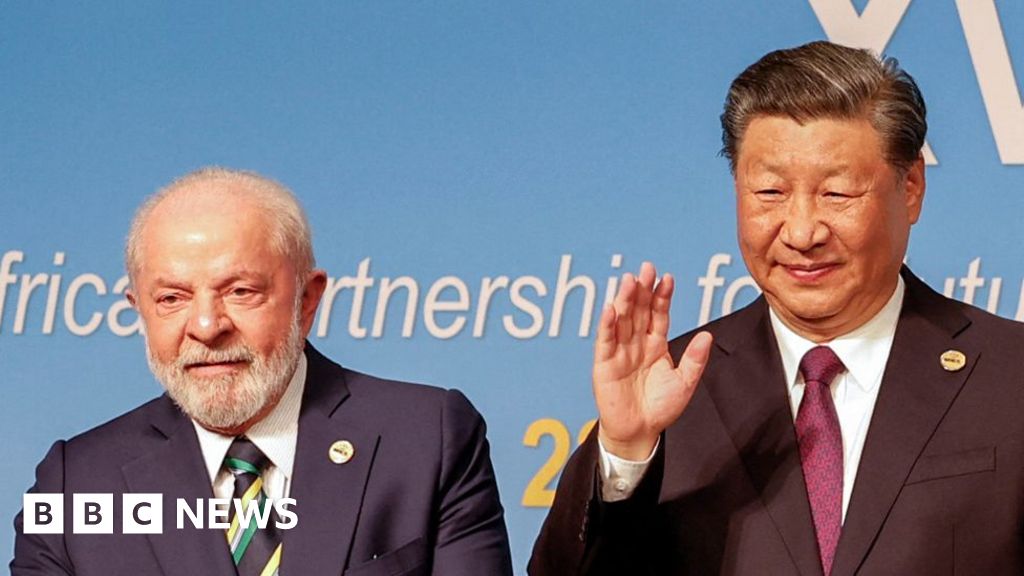Brazil’s Return to BRICS: Lula’s Revival and Future Prospects
Image Source: Getty Images
Image Caption: President Lula of Brazil is keen to promote BRICS, but China remains dominant
More than a year and a half has passed since Luiz Inácio Lula da Silva returned to Brazil’s presidency, re-emerging from the political wilderness after his corruption conviction was annulled. Since then, Lula’s comeback has provided fresh impetus to one of the world’s most unexpected economic alliances – the BRICS, comprising Brazil, Russia, India, China, and South Africa.
During his first presidential term from 2003 to 2010, Lula played a crucial role in shaping BRICS into a geopolitical entity aiming to serve as a counterbalance to Western dominance. Today, the bloc is gaining new vigor and has evolved into BRICS Plus. A landmark summit in Johannesburg last August saw the initial members agree to admit new countries, including Saudi Arabia and Iran.
Historically, the formation of BRICS was the brainchild of economist Jim O’Neill, who envisioned it more as an investment class than a political coalition. However, Brazil, under Lula, saw BRICS as a path to elevate its foreign policy aspirations.
At the Johannesburg summit, Lula was optimistic about the group’s economic prospects. “We have already surpassed the G7 and account for 32% of global GDP in purchasing power parity,” he declared, highlighting projections that emerging markets would experience the highest growth rates in the coming years. “This shows that the dynamism of the economy is in the global South and the BRICS is its driving force,” he added.
However, Jim O’Neill, now Baron O’Neill of Gatley, noted that economic growth within BRICS is heavily skewed towards China and India. “None of the other BRICS has performed anywhere near as well as those two,” he remarked. China, he pointed out, “dominates the BRICS by being twice the size of all the others combined," akin to how the US dominates the G7.
From an economic standpoint, what does Brazil gain from being in this alliance? Rodrigo Zeidan, a Brazilian economist at NYU Shanghai, explains that Brazil and China view BRICS as a strategic hedge in their global alliances. “The BRICS right now, for Brazil, cost almost nothing. So if the benefits are not high, it’s fine. They are neither a big benefit nor a hindrance,” he says. Additionally, China being Brazil’s largest trading partner secures Brazil’s interest in maintaining close relations with Beijing.
However, some analysts caution about Brazil’s growing dependency on China. Monica de Bolle of the Peterson Institute for International Economics argues that Lula might be too naïve in his commitment to BRICS, potentially risking Brazil’s other foreign policy relationships. The ever-increasing anti-China sentiment in the US, irrespective of the election outcomes, could pose future challenges for Brazil due to perceived alignment with China.
One clear benefit for Brazil from the BRICS alliance is the New Development Bank (NDB), a multilateral lender described by Lula as "a milestone in effective collaboration between emerging economies." Headed by former Brazilian President Dilma Rousseff, the NDB’s headquarters in Shanghai play a critical role in Brazil-China relations. Recently, the NDB provided over $1.1 billion to aid rebuilding after floods in southern Brazil.
However, international sanctions and geopolitical crises create complications within BRICS. Following the Russia-Ukraine conflict, the NDB ceased all transactions involving Russia, but with Russia assuming NDB’s rotating presidency in mid-2025, the future remains uncertain.
Lula ardently advocates for BRICS as a tool to reform global governance and amplify the voices of developing countries. He criticizes global institutions’ "paralysis" and praises the expansion of BRICS as a step towards more diverse perspectives. Yet critics argue that the bloc’s internal contradictions, with Russia at war in Ukraine, and Sino-Indian tensions, render it ineffective.
Ultimately, BRICS appears as a heterogeneous group, united only by their size, with no clear agenda. While the current low stakes make the alliance manageable for Brazil, any shift in China’s assertiveness could swiftly present Brazil with challenging decisions.
In essence, BRICS represents a strategic option for Brazil under Lula’s leadership, offering potential benefits and collaboration. However, the real impact of this alliance on Brazil and the global order remains contingent on future geopolitical dynamics.
For more information about BRICS, visit the official NDB website.
